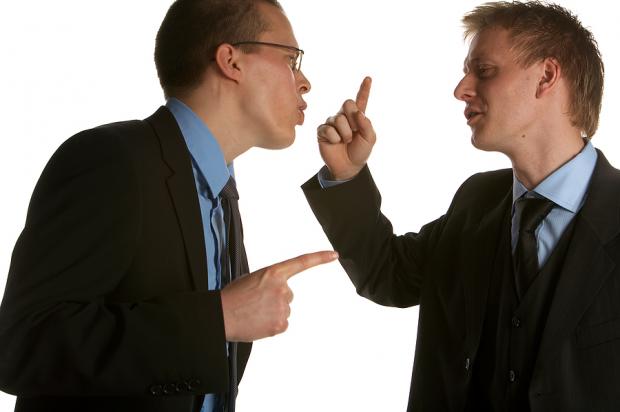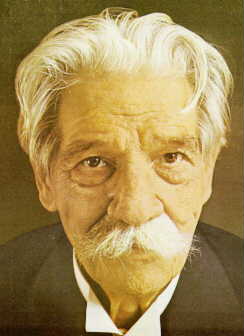
This is a reprint of an article that appeared first in August of 2011. I hope you find it helpful.
Part 2 of 6
This series is based on the last chapter of the book
“Good to Great in God’s Eyes” by
Chip Ingram. The first subject dealt with the principle of priority –
“Put God First.” We looked at the reasons why God has to be at the center of any meaningful change in our lives.
Today I'm writing about taking out the trash, or the principle of
transformation. How is it that we can be changed from the person that
we’ve been into the person we want to be? Is change even possible? Many
people would say that it’s not. You are who you are and you’re stuck
with it.
What is it that makes us what we are, anyway? Is it genes? Is it our
upbringing? Is it the experiences we’ve had; the trauma we’ve endured
or the examples we’ve seen? The truth is that it’s all of these things
and none of these things. All of these have a bearing on the kind of
people we’ve become. But I can show you people who’ve been raised in the
same home, been through the same things, had the same type of
upbringing and yet are radically different. So, what is it?
I believe that much of who we are is based upon what we do with what
we’ve experienced, and that is dictated by the way that we think. The
principle of transformation comes straight out of Romans 12:2:
“Do
not conform to the pattern of this world, but be transformed by the
renewing of your mind. Then you will be able to test and approve what
God’s will is—his good, pleasing and perfect will.” There's a
negative command in that verse that literally says to stop being
conformed, or molded, to this world. Quit allowing the world system —
its ideas, images, and values — to shape who you are. Get the trash out
of your life.
This world and its systems have a powerful affect on the way that we
think. If we’re not careful, we just gradually absorb messages over
time and begin to accept them without thinking about whether or not
they’re true. What are the lies that we believe? Many women believe that
they have to look like Barbie; that they will never be good enough for
someone to love them; or that they’re stupid, or fat and ugly; or that
they are worthless or a lousy mother or wife. Many men believe that they
will never amount to anything; that they’re a failure; that money or
work equal love; that no matter what they do they’re not good enough.
That message might have come from the media or from a family member,
from our friends or from a misguided teacher. It probably came from
someone who didn’t intend to give you that message, but it’s there just
the same. No matter what you do, that message that is recorded in your
mind just keeps cropping up, keeping you from moving forward.
It’s not just those personal messages either, there are also truth
claims that people accept, without thinking, that have a way of
cluttering up our minds and confusing us. These are cultural assumptions
that go unchallenged, and often leave us believing a lie. A famous
Canadian example is the unimpeachable value of tolerance. Now I’m all
for tolerance, by the original definition. What it used to mean was that
you tolerated people who were different from you and allowed them to
practice their beliefs in freedom. But what it’s grown to mean in
today’s culture is quite different. Today any questioning of the truth
claims of another person or religion makes you intolerant. A fall-out
from that is that a great many people have lost the ability to think
critically; to use reason. One of the lies I hear repeated often is that
all religions are basically the same. That is not even close to being a
true statement, but many accept it as fact.
So what are we to do with the messages in our minds that don’t
belong; that are actually harmful? How do we change this? The first
thing we need to do is to stop allowing the wrong sources to program our
thinking. It’s the first rule of holes: when you’re in one – stop
digging.
The second thing we need to do is to replace the lies with the truth. In 1 Corinthians 13:11 Paul says,
“When
I was a child, I talked like a child, I thought like a child, I
reasoned like a child. When I became a man, I put the ways of childhood
behind me.” In the Greek, it’s far more expressive. It basically says that he abolished and did away with the childish thinking.

In a modern analogy, it’s like going through all of the old files on
your computer and getting rid of the unnecessary ones that you never
use anymore. There are some files that just take up space and slow the
system down. There are others that can actually be harmful, like
viruses, and the longer you allow them to hang around, the more damage
they cause you. They can sometimes make the whole system crash. GIGO
(Garbage In, Garbage Out).
A lot of people can identify the thinking that has gotten them
messed up, but don’t know how to change it. In the second part of
Romans 12:2
Paul tells us how. Remember, the first part is a negative command,
basically to stop allowing the world to force you into its mold.
That's followed by a positive command to allow God's Word to renew
and transform you — to cause a metamorphosis, the same word used for the
transfiguration of Jesus. Grammatically, this command is in the passive
voice; God does it, but we allow it. We let our minds be transformed
from the inside out so we can be people who prove and experience the
will of God. Our lifestyle begins to demonstrate God's will — that which
is good and acceptable and perfect.
Chip Ingram shares a story that illustrates the reality in far too many lives:
"In
my first pastorate in Kaufman, Texas, an older man who looked like he'd
been through a lot came to church. His shirt was dirty, he looked and
smelled like he hadn't taken a bath in six months, and he was hungry. We
gave him some food, and the next week he brought his wife, who was in
just as bad a condition as he was. After the service, they said they
needed some money for electricity and other necessities."
"The church had a fund to help people, so I offered to go out to
their house and visit. Theresa and I drove out in the country and found a
house that didn't look very bad at all. A couple of horses and about
five or six dogs in the yard all looked pretty healthy. But when we
entered the house, I almost threw up from the stench. Garbage was on the
floor, a container of something that had spoiled was left open, and
cans of cat food for the nineteen cats running around the kitchen were
spread out everywhere. The shades were pulled down, and he, his wife,
and a very elderly woman sat in near darkness. I wondered how they could
tolerate such nasty conditions, but when people live around trash long
enough, they get accustomed to it. It starts to seem normal. We get used
to a nauseating stench if we breathe it long enough."
I find that there are a lot of people like this. The mess that
they're in has become "home." They know, at least on some level, that
it's not good, but they have been there for so long that the possibility
of change is foreign to them. God specializes in changing lives and
giving fresh starts. He's prescribed clear directions for us -
"be transformed by the renewing of (our) minds."
The first step on almost anyone's list is to admit that we have a
problem. Once we understand that and identify the lie that we've been
believing, we need to counteract it with the truth. It was Jesus, who
said in John 8:32,
"Then you will know the truth, and the truth will set you free.”
Here's a sensitive question - what is it in your life that needs to
change? What are the habits, lies, and attitudes that you need to take
to the curb? There may be more at stake than you realize. For some, the
decisions you make can not only improve your life, but the lives of
those around you. Some lies (and some sins) are generational. Someone
started it, and someone needs to end it. Let that someone be you.
As J. Michael Straczynski said,
“People spend too much time
finding other people to blame, too much energy finding excuses for not
being what they are capable of being, and not enough energy putting
themselves on the line, growing out of the past, and getting on with
their lives.”
Related Posts:
“Put God First” - The Principle of Priority
Developing Great Habits
Who I Am Makes A Difference
Are You Listening?
Transformation
 Yesterday
my first grandchild was born – Luke Wesley denBok. He came into the world amid
a flurry of activity and mixed emotions, as life’s complications threatened to
deprive us of the sheer joy of the moment. But into this world he came, ready
or not.
Yesterday
my first grandchild was born – Luke Wesley denBok. He came into the world amid
a flurry of activity and mixed emotions, as life’s complications threatened to
deprive us of the sheer joy of the moment. But into this world he came, ready
or not.






















